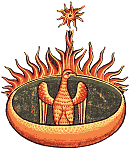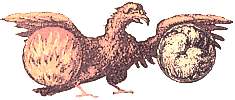

Early humans were very interested in birds and attributed magic and religious powers to them. The connection between birds and death that humans have imagined since prehistoric times still persists strongly in some modern folklore. There are also early hints of humans forming an association between birds and human reproduction. Somewhat later birds were regarded as weather changers and forecasters. Birds symbolized the mysterious powers that pervaded the wilderness in which humans hungered, hunted, and dreamed. Thus it is not surprising that many mythological creatures, such as thunderbird, phoenix, and roc, take the form of birds.
In ancient Egypt and in classical antiquity, the phoenix was a fabulous bird associated with the worship of the sun. The phoenix was said to be as large as an eagle, with brilliant scarlet and gold plumage and a melodious cry. Only one phoenix existed at any one time, and it was very long-lived--no ancient writer gave it a life span of less than 500 years. As its death approached, the phoenix fashioned a nest of aromatic boughs and spices, set it on fire, and was consumed in the flames. From the pyre miraculously sprang a new phoenix, which, after embalming its predecessor's ashes in an egg of myrrh, flew with the ashes to the City of the Sun, in Egypt, where it deposited them on the altar in the temple of the Egyptian god of the sun. The phoenix was understandably thus associated with immortality and the allegory of resurrection and life after death. The phoenix was compared to undying Rome, and it appears on the coinage of the late Roman Empire as a symbol of the Eternal City.
It commonly appears in literature as a symbol of death and resurrection.
Compton's Encyclopedia Online v3.0 © 1998 The Learning Company, Inc.

THE PHOENIX
Ovid tells the story of the Phoenix as follows: "Most beings spring from other individuals; but there is a certain kind which reproduces itself. The Assyrians call it the Phoenix. It does not live on fruit or flowers, but on frankincense and odoriferous gums. When it has lived five hundred years, it builds itself a nest in the branches of an oak, or on the top of a palm tree. In this it collects cinnamon, and spikenard, and myrrh, and of these 'materials builds a pile on which it deposits itself, and dying, breathes out its last breath amidst odours. From the body of the parent bird, a young Phoenix issues forth, destined to live as long a life as its predecessor. When this has grown up and gained sufficient strength, it lifts its nest from the tree (its own cradle and its parent's sepulchre), and carries it to the city of Heliopolis in Egypt, and deposits it in the temple of the Sun."
[see source: Ovid's Metamorphoses, Book XV - beginning line 579]
Such is the account given by a poet. Now let us see that of a philosophic historian. Tacitus says, "in the consulship of Paulus Fabius (A.D. 34) the miraculous bird known to the world by the name of the Phoenix, after disappearing for a series of ages, revisited Egypt. It was attended in its flight by a group of various birds, all attracted by the novelty, and gazing with wonder at so beautiful an appearance." He then gives an account of the bird, not varying materially from the preceding, but adding some details. "The first care of the young bird as soon as fledged, and able to trust to his wings, is to perform the obsequies of his father. But this duty is not undertaken rashly. He collects a quantity of myrrh, and to try his strength makes frequent excursions with a load on his back. When he has gained sufficient confidence in his own vigour, he takes up the body of his father and flies with it to the altar of the Sun, where he leaves it to be consumed in flames of fragrance."
[see source: The Annals of Publius Cornelius Tacitus - Book. 6, section 28]
Other writers add a few particulars. The myrrh is compacted in the form of an egg, in which the dead Phoenix is enclosed. From the mouldering flesh of the dead bird a worm springs, and this worm, when grown large, is transformed into a bird. Herodotus describes the bird, though he says, "I have not seen it myself, except in a picture. Part of his plumage is gold-coloured, and part crimson; and he is for the most part very much like an eagle in outline and bulk."
The first writer who disclaimed a belief in the existence of the Phoenix was Sir Thomas Browne, in his "Vulgar Errors" (Pseudodoxia Epidemica), published in 1646. He was replied to a few years later by Alexander Ross, who says, in answer to the objection of the Phoenix so seldom making his appearance, "His instinct teaches him to keep out of the way of the tyrant of the creation, man, for if he were to be got at, some wealthy glutton would surely devour him, though there were no more in the world."
[see source: Thomas Browne's Pseudodoxia Epidemica - Bk. 3, Ch. 12: "Of the Phoenix"]
Dryden in one of his early poems has this allusion to the Phoenix:
"So when the new-born Phoenix first is seen
Her feathered subjects all adore their queen,
And while she makes her progress through the East,
From every grove her numerous train 's increased;
Each poet of the air her glory sings,
And round him the pleased audience clap their wings."
Milton, in "Paradise Lost," Book V., compares the angel Raphael descending to earth to a Phoenix:
"...Down thither, prone in flight
He speeds, and through the vast ethereal sky
Sails between worlds and worlds, with steady wing,
Now on the polar winds, then with quick fan
Winnows the buxom air; till within soar
Of towering eagles, to all the fowls he seems
A Phoenix, gazed by all; as that sole bird
When, to enshrine his relics in the sun's
Bright temple, to Egyptian Thebes he flies."
Pandora's Box
In classical mythology, a box that Zeus gave to Pandora, the first woman, with strict instructions that she not open it. Pandora's curiosity soon got the better of her, and she opened the box. All the evils and miseries of the world flew out to afflict mankind.
To "open a Pandora's box" is to create a situation that will cause great grief.
-- Source: The Dictionary of Cultural Literacy
![]()
GRAPHICS FROM:
Zena's
Clipart
~
Individual ~ Physical
~ Spiritual
~
Index ~ Webrings
[New]
[Fine
Art]
[Genealogy/The
Counts of Helfenstein]
[Family/Genealogy]
[Links] [Soundgarden/Music] [Reference]
[Trailer
Park]
[Webrings]
[Writings]
[Astronomy] [Gypsies]
[Moon]
[Phoenix]
[Stones]
[Tarot] [Totems]
[Astrology]
[BOS]
[Charge]
[ Herbs]
[Planetary]
[Principles]
[Rede]
[Seasonal]
[Witchcraft]
Get
your horoscope for today instantly!
Forum
~
Comments
& Discussion List
Join my
Webring: Pagans of the World